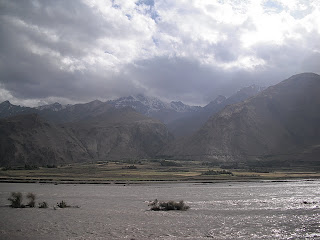In which I have more foriegn policy experience than Sarah Palin.
For hour after bumpy, circuitous hour, the road into the Pamir mountains winds along the Amu Darya, the river dividing Tajikistan from Afghanistan. There it was, a literal stone's toss away. I could see women washing clothes and children swimming, haystacks collected in nearly vertical fields, mud houses, processions of donkeys along the parallel cliff side paths. It is hard to reconcile the peaceful vista with the tragedy of the American aid workers who were killed by the Taliban in Afghan Badakhshan. In the Afghan villages there is less new paint, fewer satellite dishes, but I have a slight sense of anti-climax that so much appeared the same between the two countries. I suppose that could make me nervous here, but I can't help feeling slightly more reassured about the Afghan situation instead.
There has been too much rain this year, and the river is muddy brown and racing through the valley. It covers the road in places - drivers get out of vehicles and wade across to test the depth, then drive gamely on. I thought about Alexander the Great ordering his soldiers to stuff their tents with straw and sew up the seams to make boats to cross this river after the retreating Persian army burned the bridges. Upstream the valley widens into the Wakhan, a strip of land tacked on to Afghanistan so that the Russian and British empires wouldn't touch borders. The river there is silver, the mountains purple and capped with snow, the wheat in its carefully hedged and terraced fields is golden and blowing in the wind. The ruins of forts on the hills were built by princes before the coming of Islam. Ignore a power line and it is easy to imagine you are a sentry scanning the horizon for invading horsemen (which made it all the odder to bump into Yale professor Elizabeth Hanson and a group of Americans in a village guest house!)
Pamiris are proud of their ancient history, and a time when, even in their isolation, they were connected and contributed to the great civilizations. The nostalgia however is mostly for the practical advantages of a relatively recent past, the Soviet era when the electricity worked in winter and everyone had a job. We rode in a jeep that must have also seen better days under the Soviets. When it broke, we sat on a rock and pick apricots, and I learned how to smash open the pits to find the nut inside. Finally, success with the wheel- the cars are old, but they are simpler to put back together - and we rolled on. But I relaxed too soon. 10 km later, it broke again. Another 10 km, again. Gradually it became clear that Ishkashim would be many hours off. Our new friend from the taxi suggested we abandon ship - we were only a few kilometers from the hot spring at Garm Chashma.
Two Americans and a Russian walked along the silent border in the dark, each of us maybe thinking that we were once enemies, and this was our battleground. The ghosts of war and politics don't disappear from places like this, but at the moment the Cold War seemed as distant as Alexander. A car stops for us, stereo blasting Russian pop hits, and two young men drive us up the mountain. From the night emerges a strange sight: a Las Vegas-style hotel, covered in flashing lights the green, white and red of the Tajik flag. Yet when we sit under the bright stars in the warm, sulphurous pool, surrounded by otherworldly mineral formations, the timelessness reemerges. The mountains don't care about borders or empires.
On both sides of the border, the people are Ismaili shiites, a branch of Islam persecuted across much of the world. The Aga Khan, the hereditary leader of the faith, has done much to try to connect his follows across the border. The weekly Afghan bazaar in Ishkashim is one of these tenuous links. Anyone can freely walk through the border crossing on either side, to meet outside an aircraft hanger in the no man's land in the middle of the river. I saw no indication that I couldn't have simply walked on into Afghanistan myself, but, have no fear, I resisted the temptation. The Afghan men were largely bearded and turbaned; I saw one Tajik teenager wearing a tight t-shirt with "Let's Talk About Sex" written across the chest. Tellingly, though, the goods were mostly the same, no matter the origin of the trader. With plastic shoes from China, and canned goods from Iran and Pakistan, the bazaar perhaps lacked the glamour of the silk road of my imagination, but the bargaining and enthusiasm were infectious.
Next time: how to get an Uzbek visa in 10.5 not-so-easy steps.
- Your Car-Window Correspondent.

No comments:
Post a Comment